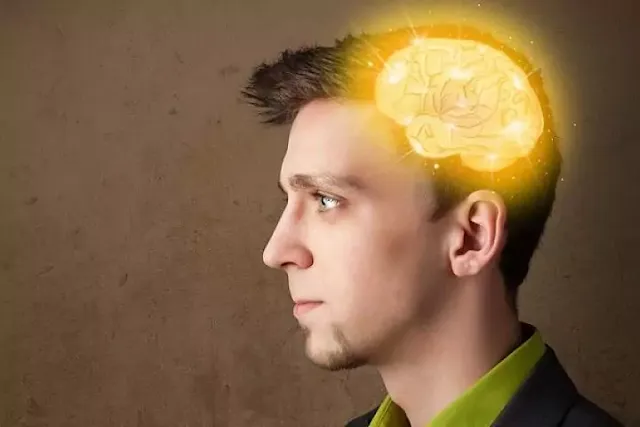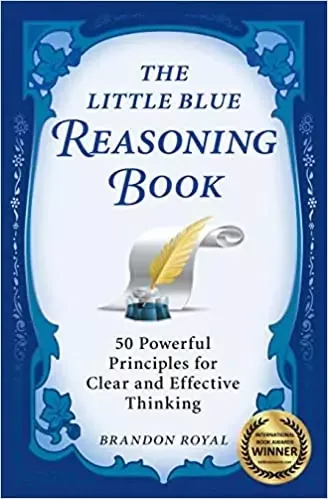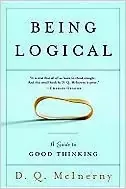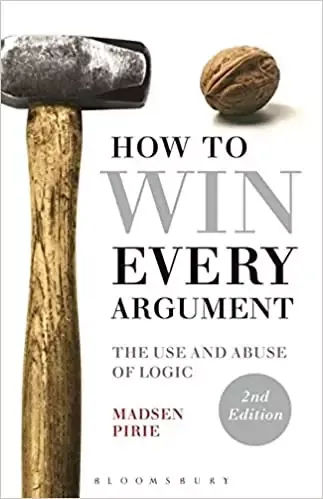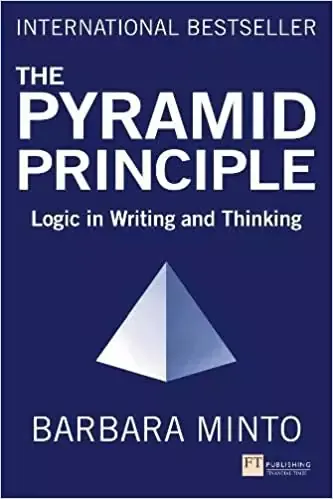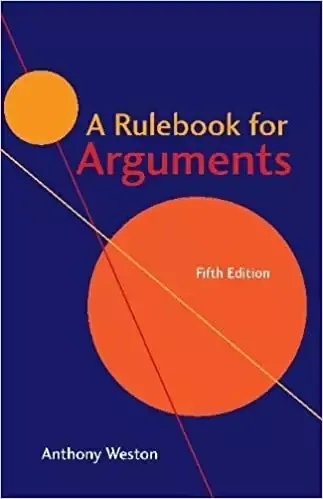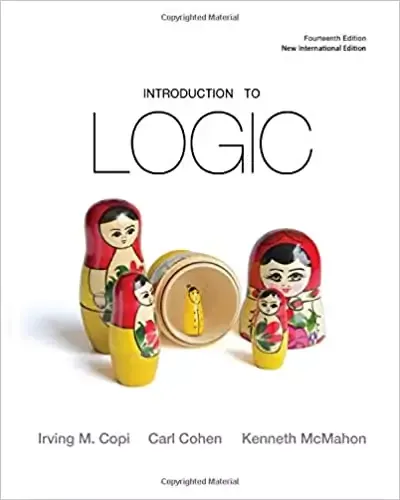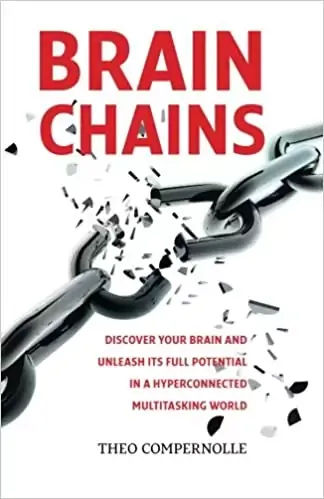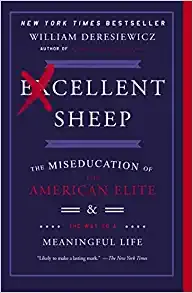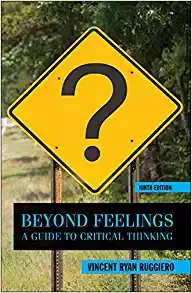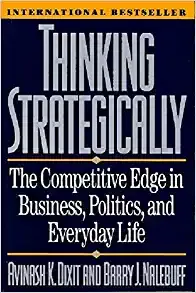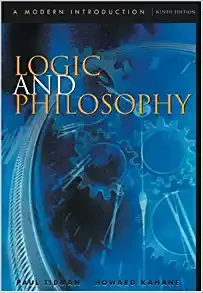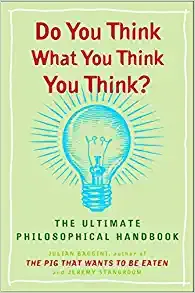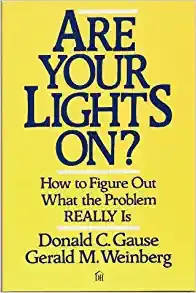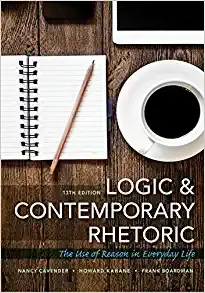18 Best Books on Logic and Logical Thinking to Read in 2024
Whether you are a scholar, a professional, or an individual interested in sharpening your critical thinking skills, this guidebook will furnish you with some valuable resources to explore the captivating world of logic.
Logic is a vital tool for reasoning and problem-solving, and refining your logical thinking skills can assist you in making sound decisions, evaluating arguments, and communicating more effectively.
Hence, regardless of whether you are a beginner or an experienced thinker, read on to discover excellent resources to improve your reasoning abilities and sharpen your mind.
Numerous outstanding books exist, and the best ones for you may depend on your background and interests.
1. The Little Blue Reasoning Book
Logic itself does not produce knowledge. Logic only provides a set of rules and methods that allow us to organize and use knowledge. How do understand this sentence? For example, the Curies discovered the element of radium.
The element radium naturally exists in nature. Before the Curies discovered the element radium, there were records proving the existence of the element radium. The contribution made by the Curies lies in extracting the element radium from nature through scientific means and summarizing the characteristics of this element.
In the process of refining and summarizing, the method they follow is the expression of logic.
This book is one of a series of well-known American popular science books. It explains the logic and several forms of logic in easy-to-understand language. As an entry-level logic book, it is very suitable for ordinary people to read.
Brandon Royle, born in Canada, studied at Harvard University and later worked as a supervisor at Kaplan, an exam training organization. His work has won the "International Book Award" five times, the "Presidential Book Award" five times, and the "Presidential Book Award" in 2011. He won the "Annual Education Book Award" in 2011.
During his tenure at Kaplan, he devoted himself to the study of English writing, grammar, and logical reasoning teaching, summing up his years of teaching experience, creating a complete set of teaching systems, and successively publishing "A Little Blue Logic Book" and "A Book" Classic works such as "Little Red Writing Book" and "A Little Golden Grammar Book" have become global benchmarks in the fields of English writing, grammar, and logical reasoning.
2. Denken lernen
This is an "anti-routine" routine book. By analyzing 21 common thinking traps, the author teaches us how to effectively jump out of thinking misunderstandings and make more correct choices. Without careful thinking, we are prone to all kinds of thinking errors pointed out in the book.
For example, the limited individual experience is summarized as a universal principle, the so-called swarming, and then the collective fall.
With his unique German rationality and speculative power, the author analyzes the essence layer by layer through the surface of the problem.
When facing a problem, we can quickly see the logic behind it so that we can make correct and reasonable decisions. Only by freely mastering the multi-angle analysis of life can we become wiser and make our lives calmer.
What is the fallacy of attribution? Why does everything look like nails with a hammer in your hand? Why do we always like to find other people's problems? Why should I ask questions in the form of "negative consequences"?
All these questions can be answered in this book.
There are many logical pitfalls in daily life. Once trapped, it is easy to get out of it. The book "Invisible Logic" presents these common logic traps to readers in easy-to-understand language.
If you think logic is particularly advanced, I suggest starting with this book. After cultivating an interest in logic, continue to learn more.
3. Being Logical
What preparation do you need to learn logic? What are the basic concepts of logic? How should syllogism be used to play its due role?
In this book, you can find the answers to these questions. This book is about the famous American philosopher and logician D. Q. McLennay wrote that more than 5,000 people rated it.
It is regarded as one of the forty classic English books by the Chinese University of Hong Kong and is regarded as a crown book by the bookstore of Harvard University.
After reading this book, I believe that I will have a clearer understanding of the basic concepts of logic.
The author tells us in the book that logic is everywhere in life. Whether we are consciously or unconsciously, logic always serves our lives. However, there may not be too many people who have a clear idea of what logic is.
The author activates logic as art with his concise and interesting brushstrokes, from its basic principles to argumentation, to the root of illogical thinking, to 28 forms of illogical thinking that happen around you, Lead us into this wonderful logical world, experience the witty clash of thoughts, cross the ubiquitous logical traps, let you indulge in it and make you want to stop.
4. How to Win Every Argument
This is a book about logical fallacies.
Why learn logical fallacy? Because many times, others will use some language skills to mislead our judgments and let us have "correct" ideas about some wrong things.
This is a very dangerous thing. For example, MLM people often use this method to brainwash members.
Therefore, learning and identifying some logical fallacies and digging out logical loopholes from other people's words can enable us to turn passive into active and better protect ourselves.
This book presents 87 formal fallacies and non-formal fallacies with vivid examples. A concise and concise analysis of them is done to the point. It is very helpful for us to identify and refute fallacies and sophistry.
Many people need a win or two to boost morale. If real victory is not available, then occasionally beating the Scarecrow can also get a great sense of accomplishment.
This sentence is a common "scarecrow fallacy" in logic.
In "How to Win Every Argument", the author lists five kinds, a total of 87 common logical fallacies. After reading this book, there are basically all logical fallacies that can be seen.
5. The Pyramid Principle
This book can be said to be famous. The author is the famous work of Barbara Minto, the first female consultant of McKinsey & Company. The book is called The Pyramid Principle because it was when writing the plan.
We must put the conclusion first, and then use several sub-arguments to explain this conclusion. Under each sub-argument, there are several arguments.
In this way, the overall structure looks like a pyramid.
This book is not strictly logic-related, but its core theory is completely in line with the logical reasoning process. So I recommend this book to everyone today.
6. A Rulebook for Arguments
Have you seen the "National College Student Debate Competition"? When the two debaters get their arguments, they will look for logical loopholes to attack their opponents while constructing their own arguments.
For one's own logic to prevail over the opponent, the debater also needs to find detailed arguments to support his argument.
It can be said that research understands what argument is, and when we express it to the outside world, we can make our chain of evidence to be tightly connected.
In "A Rulebook for Arguments", the author uses a large number of easy-to-understand, interesting, and life-like examples to summarize 50 rules of argumentation that must be followed, covering various disciplines and types of argumentation.
The book first explains the general principles of constructing a brief theory: how to start from a reliable premise, how to straighten out ideas, and how to make your own argument concise and specific; secondly, it introduces example argumentation, causal argumentation, and deductive argumentation, and discusses detailed and oral arguments.
Statements, essay writing, and public debate should follow the rules; finally, the author reveals the common fallacies and pitfalls in the process of argumentation.
7. Introduction to Logic
This book can be called a classic of logic teaching materials, including classical logic and post-modern logic. It has been republished more than ten times so far, and it is enduring.
This is a classic textbook of logical thinking. The biggest feature of the book is that it can express abstract and boring logical principles in plain language, combined with some cases in the US Congress and newspapers, which is lively and interesting!
It systematically introduces the knowledge points involved in learning logic. It is broad and comprehensive. The number of exercises is more difficult and pertinent. However, if the mathematics is not good, the deduction part will be more difficult.
This is the first textbook for self-learning logic, and there is no comparison with other books. Such a generalization may be somewhat limited.
In addition, the translation is rather pale, and incomplete answers may cause some confusion to readers. For students who want to systematically learn logical thinking, this book is still a good choice.
8. The Art Of Logical Thinking Or The Laws of Reasoning
The last book is "Logic Nineteen Lectures", this book is not recommended for everyone to read. The reason for not recommending is that the content of this book is rather scattered.
In addition, the basic concepts of logic are explained clearly. However, the translation is really poor, and it is particularly confusing to read.
For example, the following definition of "judgment": "Put together the two insights, concepts, or ideas that are complex or uncomplicated in the understanding of objects, and compare them in your thinking, and analyze the relationship between them, or whether one belongs to or belongs to or It doesn't belong to the other one." It feels very awkward to read, and there are many paragraphs like this.
There are many double negations, etc., in short, it is not recommended for logic and people who have difficulty understanding long sentences to read.
9. BrainChains
BrainChains: Your thinking brain is explained in simple terms by Dr. Theo Compernolle MD.PhD
In modern society, the pace of life is getting faster and faster. Everyone is busy, it seems that one day has passed. I lie in bed at night and think: What did I do this day? In a daze, there is no answer. Just like a person who wears a blindfold and is driven by others, he is extremely lacking in self-awareness and awareness.
Therefore, "focus on oneself" is the scarcest resource in this era. Only concentration can slow down time and allow us to "think slowly."
This is a book that subverts the habit of thinking. Starting from the structure of the brain, analyze the "four chains" that destroy the brain's intellectual performance, and provide us with specific unlocking techniques and tools.
This will further help readers devote important time to creative ideas and correct decisions, and improve processing capabilities and work efficiency.
10. Excellent Sheep
What is so good about going to an Ivy League school? Is it the face of the parents? Or to prove your own wisdom and wisdom? The author said that the greatest achievement of some Ivy League students in their lives may just be that they went to a certain Ivy League school.
The book counts the "several sins" of students in Ivy League schools such as Harvard, Yale, and Princeton, and proposes that "Ivy League schools are far inferior to public universities.
Schools pay more attention to education, and their teaching methods are more flexible and cutting-edge". Once listed, it caused widespread controversy in American society.
If you are worried about which school your child is going to, you may wish to refer to the many arguments and arguments in the book, and then decide whether to conform to your blind nature and continue to work hard under the pressure of admission.
A few books on improving logical thinking skills will introduce these books. After reading them, they are basically enough for a beginner.
The above are a few books on the introduction of logic. Reading more can give us a long experience. By learning more books on logical thinking, we can learn to look at problems objectively.
11. Beyond Feelings
Going beyond feeling is helping us escape self-prejudice.
Because most of our so-called reasoning is nothing but a rationale for continuing to make us believe what we already believe.
This book is to help us sort out, those thoughts that we think are correct are actually just our own feelings. It is the ability to look at the point of view itself from a logical point of view, and it is really fulfilling to see the essence.
12. Thinking Strategically
The classic work of game theory masters, through storytelling, allows readers to appreciate the truth of game theory strategic thinking in examples. Even readers without any economic background will have no trouble reading.
13. Logic and Philosophy
A course in the fundamentals of modern logic that has been widely adopted around the world for three decades. This tutorial is written for students who need a thorough but intimate introduction to logic.
The book is known for its clear and accurate theoretical explanations, supplemented by carefully collected and designed examples, exercises, and answers to some exercises, which vividly reflect the application value of logic in philosophy and related disciplines, and also explains contemporary logic and Some cutting-edge issues in the field of philosophy of logic.
14. Do You Think What You Think You Think?
In life, it is often said that others do not speak logic, why is it easy to ignore logic in life, because we are accustomed to using self-perception to judge something;
And logic needs to be tested by reasoning and facts. This can also answer another question. I usually feel right at home, but I don't know how to convince others.
This is also because you do not use the power of logic. Using this book to challenge your way of thinking can help you relieve much deep-rooted wrong thinking.
15. Are Your Lights On?
This book discusses the various difficulties that may be encountered when solving problems with a unique perspective and humorous language, and gives pointers on how to train thinking skills;
The book is divided into six themes, each of which is composed of several interesting and thought-provoking short stories, which subtly guide the reader to identify the real problem, then identify who should solve the problem, determine the root cause of the problem, and finally decide what to do. Don't want to solve this problem.
16. Logic and Contemporary Rhetoric
If the above books have their own focus on logic knowledge, then this "Logic in Life" is a "comprehensive and simplified" version extracted after synthesizing the core content of each of the above books.
The core theme of this book is to comprehensively improve people's reasoning ability. It systematically introduces and analyzes the arguments, deductions and inductions, fallacies of reasoning, and language usage that everyone will encounter in daily life.
Through this book, you can guide yourself to think carefully about the world you live in every day and cultivate the ability to think clearly and independently. It is worth recommending to everyone.
The above is the book list for this issue, thank you for your attention, and wish us all the best!
17. Critical Thinking and Logical Reasoning Workbook-7
The Gift Of Logic (tm) Critical Thinking & Logical Reasoning Series is a set of twelve workbooks written to establish a basic standard in cognitive thinking for K-12 students.
These workbooks will help the students develop cognitive skills in three strands – Verbal Reasoning, Analytical Reasoning, and Pictorial Reasoning. Each workbook has a variety of exercises in these three strands.
These workbooks can be used by college students and working professionals as well for a quick and easy introduction to logic and reasoning. Visit the Gift Of Logic website for more information.
Ideal for use during the school day to keep the students challenged, and during winter and summer breaks to maintain strong thinking skills.
Gifted and Talented students and Homeschoolers can use it as a comprehensive curriculum.
18. Critical Thinking & Logic Mastery
We’re talking about a basic skill that isn’t so basic – critical thinking.
Everyone thinks they have it, but most people are anxious, unhappy, doubt their decisions, and aren't where they want to be in life.
Why do people smoke, drink to excess, and eat things they know are bad for them?
How come intelligent people wind up believing fake news stories?
Why do employers judge candidates on the first impression they make, even though they know it’s wrong and often misleading?
Poor reasoning, inability to tell facts from fiction, and flawed decision-making cause these kinds of fallacies.
A Nature.com study in 2015, “First results from psychology’s largest reproducibility test,” examined over 100 psychology studies to see if they could be reproduced.
Researchers found that only a third of the studies could be replicated. The other two-thirds had been skewed by errors or unconscious biases and couldn’t be trusted.
One of the reasons most of us fall short in thinking critically is that our educational system doesn't teach critical thinking.
They’re the reason most people never live up to their potential.
So, if you feel like you don't have the right diploma or the right skill set to succeed at what you do, don't worry.
You might be stunned by how many false biases you’re already carrying around. They bleed into your professional and personal life.
That’s why we’ve put together the needed resources to introduce you to what critical thinking is about, to build the habit of thinking critically, and to discern fact from fiction easily.
This book bundle includes:
- Critical Thinking In A Nutshell: How To Become An Independent Thinker And Make Intelligent Decisions
- Conquer Logical Fallacies: 28 Nuggets Of Knowledge To Nurture Your Reasoning Skills
- The Habit Of Critical Thinking: Powerful Routines To Change Your Mind And Sharpen Your Thinking.
Here's just a fraction of what you'll discover inside:
- The critical thinking framework developed by two of the most experienced critical thinking scientists of all time and how to make it your own
- The 8 critical thinking characteristics you already have, but you’re not using at their full potential
- How to identify fake news and misinformation - learn this, and you'll have a MASSIVE leg up on almost everyone around you right now
- Why you should be skeptical of anyone quoting an authority figure
- How to make yourself “dumb” because smarter people are HARDER to teach
- 6 rules to turn your current routines into wholesome habits
- How to think like a scientist and make your decisions successful experiments
- Actionable, easy exercises to drill home every point covered. You won't "read and forget" this book.
…and much, much more!
This bundle isn't a dry, theoretical textbook. It is a practical, easy-to-read, and implemented book dedicated to helping you build stronger arguments, make more confident decisions, and spot logical errors.
Critical thinking will elevate your personal and professional life. You’ll be better at assimilating information, noticing trends, and deciding on a plan of action. This one will be the last book you need to buy on thinking logically and building habits.
Conclusion: Best Books for Logic and Logical Thinking
The cruciality of logic and logical thinking is indubitable. These aptitudes are indispensable for arriving at better decisions and more efficiently solving problems in all facets of our existence.
By assimilating the principles of logic, the diverse categories of logical reasoning, and the means to imbue logical thinking into our daily lives, we can evolve into more astute and discerning thinkers.
We have proffered several books concerning logic and logical thinking, each imparting invaluable perspectives and tactics for honing our logical thinking abilities.
We urge our readers to persevere in exploring the realm of logic and logical thinking. Innumerable supplementary resources are available, such as online courses, workshops, and podcasts, that can further intensify your comprehension of these fundamental skills.

